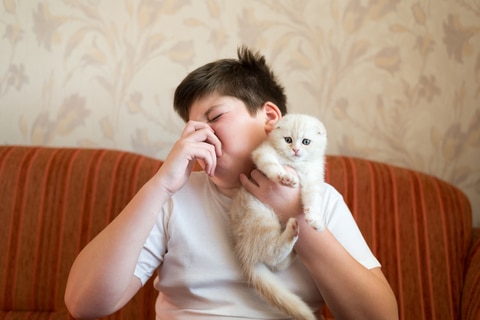Everything, Cats, Grooming, Pet Odor Removal, Pet Care
Easy ways to eliminate pet odors from your home.
Cats are wonderful pets as many cat owners will attest. However, the pet odors associated with cats often create havoc in many households. It is quite possible to enjoy cat ownership and eliminate pet odors if you remain diligent in your efforts.
Cat lovers list many qualities that make them absolutely love the cats in their lives. They also list a few detriments to cat ownership as well. Unlike dogs, are generally housed entirely indoors. With close cohabitation comes odors, fur and litter boxes. In multi cat households, there are even more opportunities for creating the dreaded “cat smell”. To eliminate the cat odors you need to remain diligent in your efforts.
Keep those litter boxes clean.
Cat urine odors are absolutely horrible, but are not impossible to eliminate. Keeping the litter boxes clean involves much more than simple scooping of waste—although multiple daily cleanings are helpful. Cat owners need to also completely sanitize the litter box a few times per month as well with an enzymatic pet stain and odor remover. Litter pan liners help, but plastic litter boxes trap odors. Sanitizing them will help keep those trapped odors from lingering. If you just can’t get your pet to stop going outside the litter box, read our article entitled When Your Cat Won’t Use the Litter Box.
Think outside the litter box.
Litter box filler does not always stay inside the box. The area outside the box gets quite a bit of thrown and tracked litter, which is often soiled with pet waste. Thoroughly vacuum outside the litter box daily and treat around each household litter box with an enzymatic cleaner specifically formulated for pet waste odors.
Keep you cat groomed.
Most cats perform ritualistic, if not compulsive, grooming acts frequently. However, some cats do not. Larger cats or those of long-haired breeding often have more difficulty with self grooming. Regular grooming helps these cats significantly. It helps prevent matted fur and body oil build-up or skin irritation. If your cat has difficulty removing his body oils, you may need to learn to bathe him periodically. Cats generally do not enjoy these baths, but body oils do create odors. Bs sure to put the extra effort into bathing and grooming your kitty if they are not up to the task.
Stay up to date on veterinarian visits.
If your kitty is urinating outside the litter box or has a less than pleasing odor, there may be an underlying medical condition causing the problem. Urinary tract, bladder and kidney issues are quite common—especially in long-haired, male cats. Skin irritations are common and can become stinky, especially if scratching has led to an infection. Ensuring that your cat is healthy is not only a quality of a responsible pet owner, but will reduce or eliminate many cat related household odors as well.
Become meticulous with housekeeping.
Cats are quite unlike their canine counterparts. Cats nap where the mood strikes—and not always in the same location. If a good beam of sunlight breaks through, a new napping place is born. Pay attention to spots where the cats frequent and plan to clean those more often. To totally eliminate pet odor regularly, you will need to be more willing to clean the entire house more often. This includes including under beds, behind furniture and other dark, hidden, cat friendly hiding places. Rather than cleaning the carpet twice a year, you may need to clean every 2-3 months. Clean upholstery frequently as well. If your cats choose to nap on bedding or sofa pillows, those may need weekly cleanings with enzymatic cleaners.
Get rid of vomit odors
Pet urine and body oils are not the only source of cat odors. Cats frequently vomit to eliminate hairballs. Be sure to clean these accidents with enzymatic cleaners or a high quality pet odor removers rather than simple stain removers. Stain removers alone may diminish the stain, but will not eliminate pet odors.
You love your cat and you love your home. With a little extra cleaning effort, you can wipe out those cat odors and live happily ever after.


